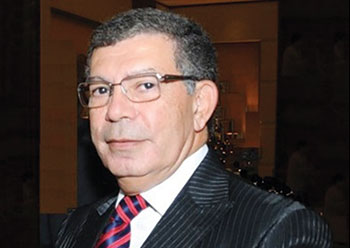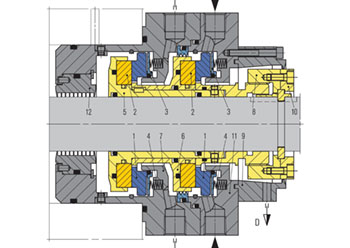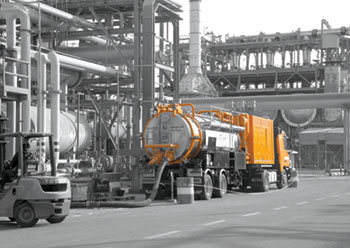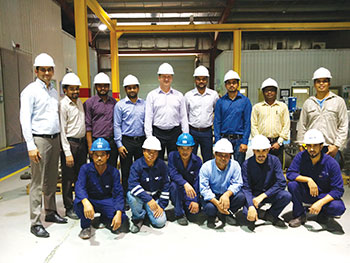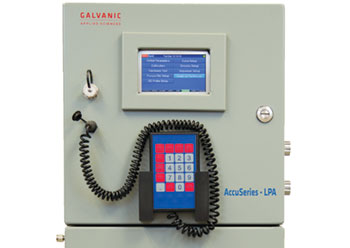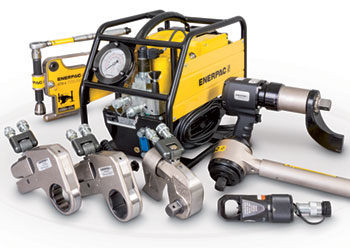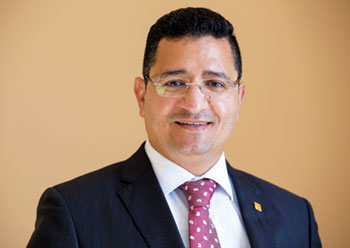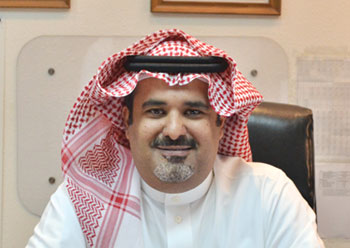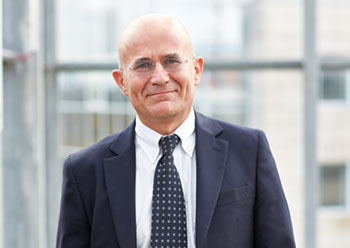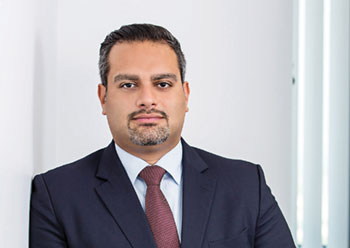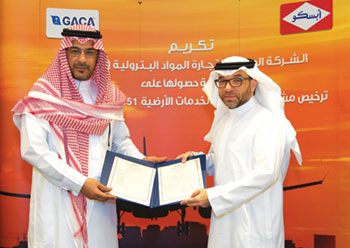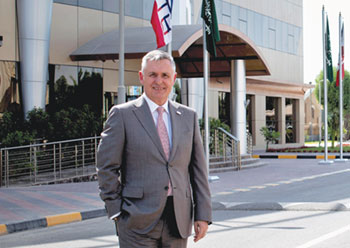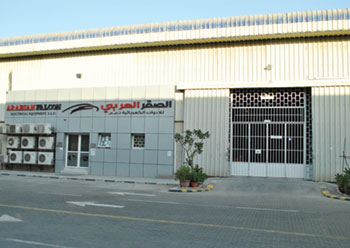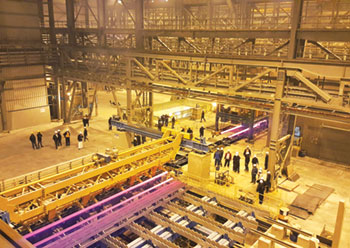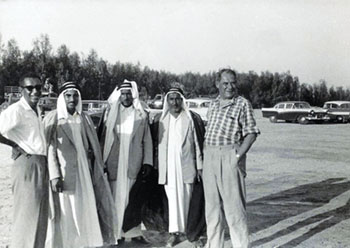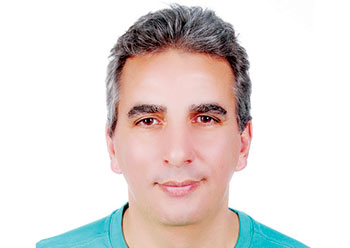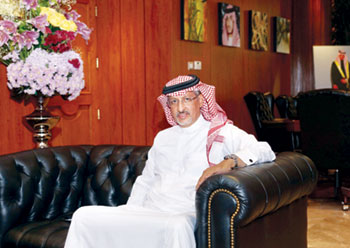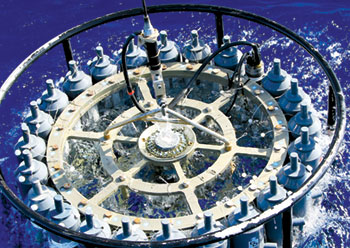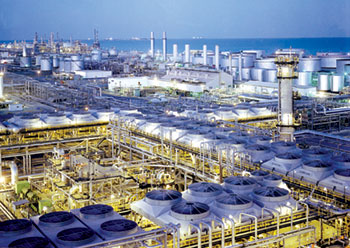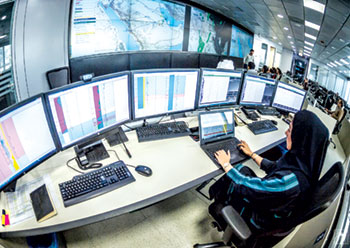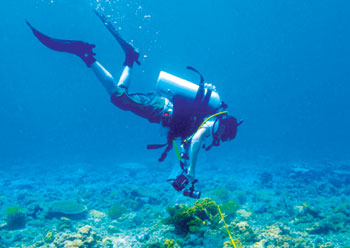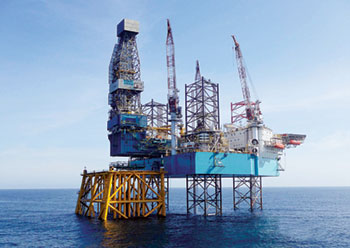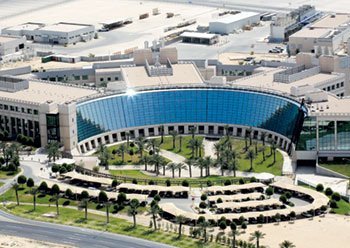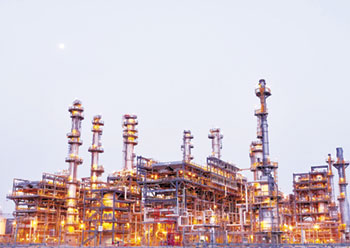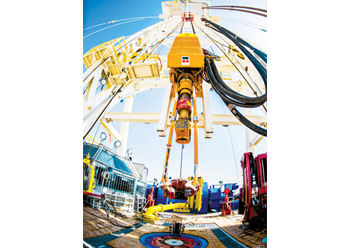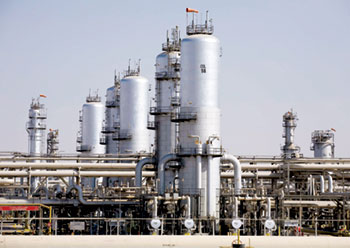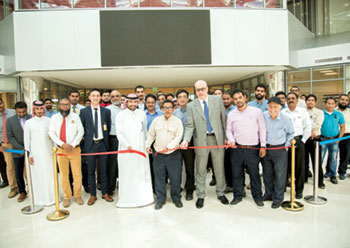
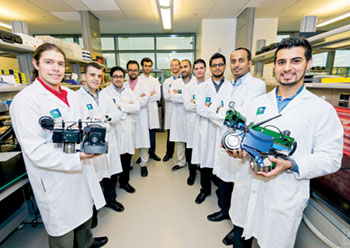 Saudi Aramco’s officials present inspection robot Sair
Saudi Aramco’s officials present inspection robot Sair
To enable increasingly efficient operations, Aramco supports endeavours to enhance the domestic energy sector and diversify the economy
Arobust supply chain, innovative energy and technology entrepreneurs, and a globally competitive workforce are in Aramco’s strategic interest and play an important role in improving its commercial performance.
By supporting capacity building in the kingdom’s energy sector, fostering small- to medium-sized enterprises, and establishing national training centres, Aramco plans to enhance the reliability of its supply chain, improve the efficiency of its operations, and build its workforce of the future.
Together, Aramco believes these programmes will accelerate growth and create new value for the company, as well as for the kingdom.
ARAMCO’S SAFETY PERFORMANCE
The lost-time injury (LTI) rate for Saudi Aramco employees at 2017 year-end was 0.02 per 200,000 work hours, a significant improvement compared to the 2016 LTI rate of 0.05. There were no on-the-job fatalities for Saudi Aramco employees.
Aramco’s ongoing efforts to embed safety awareness through on-the-job training was key to its improved performance. Understanding that off-the-job traffic accidents in Saudi Arabia are a critical safety concern, Aramco proactively manage driver performance through monitoring devices. At year-end, 79 per cent of the company’s in-kingdom fleet had the monitors installed.
Overall, its Traffic Safety Signature Programme has contributed to a 30 per cent reduction in motor vehicle accidents for Saudi Aramco employees. Aramco’s efforts to improve driver safety were recognised by the American Society of Safety Engineers, which gave its 2017 Safety Innovation Award to its driver safety system. The system measures patterns in biometric signals and incorporates safety engineering principles and behaviour change to help reduce traffic accidents.
CARING FOR CONTRACTORS
The safety, health, and well-being of its contractor workforce is of paramount concern to Aramco. To help ensure standards and practices are met, in 2017 Aramco conducted more than 2,400 audits and inspections of contractor communities. Aramco’s Loss Prevention organisation communicated its findings to proponent organisations to implement improvements. Aramco supported the Qyadati driver safety programme, an online multi-language driver awareness programme. Now mandatory for all supplemental manpower and project management contractors, 19,000 driving certificates were issued in 2017.
More than 3,000 contractor employees in Aramco’s Southern Area Oil Operations organisation benefited from an innovative safety campaign. The "Our Safety is You" campaign featured a number of educational platforms specially designed to encourage participation and promote the awareness of common safety concerns – on- and off-the-job.
EMBEDDING A PERFORMANCE CULTURE
Aramco’s Operational Excellence (OE) initiative provides a framework for managers and describes how they can implement the system to fulfill their safety and loss prevention obligations. It drives Aramco’s efforts to cost-effectively achieve leading performance in safety, reliability, and efficiency. Working to integrate Aramco’s day-to-day work into the OE structure, a dedicated OE organisation provides consultation, training, and certifying of OE implementers and assessors.
In 2017, Aramco conducted 51 OE integrated assessments, yielding significant opportunities for improved performance. Aramco remained on track to assess all its departments by the end of 2019.
Enhancing capability
To become the world’s leading integrated energy and chemicals producer, Aramco needs people with best-in-class capabilities. Accordingly, Aramco delivers continuous development and skill building opportunities to its workforce. Tailored to meet the growing responsibilities of its evolving business, Aramco offers a wealth of online and classroom courses, specialised training centres, internships, and mentorship programmes.
Aramco’s suite of development programmes range from equipping entry-level employees with the right skills to sponsoring employees for advanced degrees at international universities.
Aramco’s future success is dependent upon the progressive development of its upstream professionals, especially as its workforce trends younger: Nearly 60 per cent of Saudi Aramco’s workforce is 35 or younger.
 |
Shallow water inspection and monitoring |
Aramco’s Upstream Professional Development Centre (UPDC) is designed to provide accelerated skills building and knowledge transfer to young men and women entering the exploration and petroleum engineering fields. UPDC offers immersive and interactive learning environments, including cutting-edge drilling simulators and a 4-D facility that enables the visualisation of the subsurface and the modelling of production strategies.
In 2017, 5,700 participants attended more than 350 training sessions. Aramco’s Hosted University Programme expands advanced degree opportunities for its employees. This cost-effective approach brings the knowledge and expertise of leading global universities and institutions to the kingdom to deliver customised, business centreed academic degrees. In 2017, Aramco initiated a specialised and accelerated master’s degree programme in geophysics from the University of Leeds in the UK. Since the programme’s inception in 2009, more than 10 international universities have participated and more than 400 employees have earned degrees.
DEVELOPING LEADERS
The achievement of Aramco’s strategic vision requires new skills at every level. Nowhere is this more relevant than among Aramco’s leadership. In 2017, Aramco delivered a suite of professional training programmes designed to build capabilities to support Aramco’s strategic vision and Aramco’s entry into new industry sectors to more than 22,000 participants from various levels of professional employees and management. Aramco also commenced Aramco’s Emerging Women in Leadership Programme to identify women with outstanding leadership and professional career potential.
Selected employees attended the Advanced Women in Leadership Programme conducted by Wharton University of the Pennsylvania Institute of Executive Management.
In addition to supporting its incumbent workforce, Aramco prepares new generations to be "job ready." Aramco’s Industrial Sponsorship Programme prepares Saudi high school graduates and vocational college students for jobs in administration, operations, security, fabrication, and maintenance. In 2017, more than 3,200 apprentices graduated from the programme and joined the workforce. To ensure it maintains a steady stream of entry-level Saudi professionals, Aramco offers the College Degree Programme for Non- Employees (CDPNE), a highly selective scholarship programme for male and female Saudi high school graduates.
Participants who successfully complete the 10-month College Preparatory Programme in Dhahran are sponsored to study for a bachelor’s degree at KFUPM or at an international university in a discipline aligned with Aramco’s strategic needs. In 2017, 308 CDPNE graduates joined the workforce. Overall, nearly 2,500 company sponsored students were enrolled at colleges and universities in North America, Europe, Asia, and Australia in 2017. These programme graduates, and employees returning from internships with global companies, bring with them new ideas and a broader understanding of international business, benefiting the company and the kingdom.
BUILDING SUSTAINABLE COMMUNITIES
The health and well-being of Aramco’s employees and their families are essential enabling factors for the people to perform at their best. Aramco continued progress in 2017 on several large-scale planned communities, each of which is designed to model leading sustainability practices. Aramco’s largest project is the South Dhahran Home Ownership Programme (Ajyal, Arabic for "generations"), which is planned to provide 8,500 residential units.
Aramco completed 180 houses in 2017. In Aramco’s East Dammam I project, Aramco distributed 228 villas, and in East Dammam II, Aramco distributed 764 lots ready for owners to begin home construction. Since 1951, Aramco’s Home Ownership Programme has financed more than 68,000 new homes for Saudi families. In addition, Aramco developed a slate of new housing in existing communities, including the completion of 360 housing units for occupancy in Aramco’s main community of Dhahran.
 |
A Nabors oil rig |
As Aramco enters new markets and businesses, helping build skills and capacity in the Saudi workforce is aligned with its longterm needs. It also benefits the kingdom’s efforts to diversify the economy.
In 2017, Aramco continued its support for national training academies whose goal is to create a globally competitive workforce. In 2017, 2,000 trainees graduated from 15 active training centres.
Highlights from selected academies include:
• The National Construction Training Centre: Expected to train and certify 2,000 Saudis over the next three years, the centre commenced operations at a facility in Nariyah with an enrollment of more than 400 trainees;
• The Maritime Academy: With a target enrollment of 1,450 trainees, the academy is planned to support the operation of the King Salman International Complex for Maritime Industries and Services;
• The Saudi Arabian Drilling Academy: More than 200 trainees are enrolled in the core programme and the first class of 94 is expected to graduate in mid-2018;
• The National Power Academy: Developed in collaboration with the Saudi Electricity Company, KFUPM, and the Technical and Vocational Training Corporation (TVTC), the academy, with a capacity for 1,200 students, will confer specialised certifications and professional degrees for personnel to work in the energy sector;
• The National Information Technology Academy: Designed to accommodate 1,000 trainees studying mobility, data analytics, and cloud computing, the academy is scheduled for a soft launch in 2018 with an initial enrollment of 100 students; and
• The Aviation Academy: With a capacity for 400, the academy opened with an initial enrollment of 150 trainees Aramco’s STEMania Programme aims to increase the interest of female students in the STEM fields. In 2017, the programme reached nearly 900 students in the Eastern and Central Provinces.
Aramco also continued its initiative to deliver seminars to help senior female university students prepare for their transition into the workplace. In 2017, Aramco delivered 9 seminars for approximately 7,000 students. Overall, since the programme’s inception in 2015, approximately 16,000 students have benefited from these seminars.
To secure Aramco’s long-term future, it is always seeking ways to optimise costs, enhance the reliability of its supply chain, and identify greater efficiencies in its operations.
Nowhere is this more important than in Aramco’s home base of Saudi Arabia. Opportunities to realise these improvements coincide with Vision 2030, the kingdom’s strategy to attain greater levels of sustained economic growth and diversification.
Launched in 2015, the In-Kingdom Total Value Add (iktva) programme is Aramco’s global supply chain efficiency initiative that will help facilitate the further development of a diverse, sustainable, and competitive energy sector ecosystem in the kingdom. Aramco’s iktva measurement continued to improve, with a goal to localise 70 per cent of expenditures for goods and services by 2021.
To support further growth to reach its 2021 target, Aramco hosted the iktva Small- and Medium-Sized Enterprises Forum and Exhibition at the Dhahran Expo that illustrated to 1,000 enterprises the breadth of opportunities Saudi Aramco offers.
By investing in the domestic oil and gas ecosystem, Aramco plans to enhance the reliability of its supply chain and optimise operational costs and inventories, which strengthen its ability to meet its commitments to customers around the globe.
As the base of small- and medium-sized enterprises expands, and as national leaders in the oil and gas ecosystem advance to become regional and international players, economic growth and job creation will be accelerated.
This transition will enhance the business climate in the kingdom and generate new opportunities for Aramco to operate even more efficiently and achieve significant cost savings.
audi Aramco pursued a number of initiatives in the domestic energy sector consistent with its localisation strategy, including forming two joint ventures to help optimise drilling costs: Saudi Aramco Nabors Drilling (SANAD), with Nabors Industries Ltd. for onshore rigs, and Aramco Rowan Offshore Drilling (ARO), with Rowan Companies plc for offshore rigs.
The ventures, which own and operate the rigs, commenced operations in 2017 and are expected to deliver approximately 5,000 local jobs.
ENGINEERING OPPORTUNITIES
Engineering and construction are potential high growth sectors closely tied to Aramco’s business objectives. In pursuit of opportunities to reduce costs, strengthen its supply chain, and spur job creation, Aramco marked a pair of milestones toward its ambition of executing 80 per cent of its engineering work in-kingdom.
First, Aramco entered an in-kingdom joint venture with Jacobs Engineering Group, which aims to provide professional programme and construction management services for social infrastructure projects, including government projects, on an arm’s length basis within Saudi Arabia. The joint venture will help build capacity in the kingdom and create opportunities for other players in this sector, with the potential to deliver approximately 3,000 jobs.
Second, Aramco established centres of engineering excellence at five local contractor offices. Aramco signed a number of other Memoranda of Understanding with international companies aligned with its strategic objectives. Each of the agreements is designed to enable greater efficiency and improved performance in Aramco’s operations, along with the added benefits of creating high value jobs for Saudis and furthering the kingdom’s economic diversification. These agreements cover areas such as digitisation initiatives, gas turbine maintenance and repair, human capital development, and oil field goods and services.
LOCALISING ARAMCO’S SUPPLY CHAIN
The King Salman International Complex for Maritime Industries and Services is envisioned to become a world-class maritime complex and a hub for regional maritime engineering, construction, and related expertise. The complex, which is expected to generate more than 80,000 jobs by 2030, targets localising essential links of Aramco’s supply chain related to offshore drilling and shipping activities. Expected benefits include reduced response times, improved agility, and cost optimisation.
Plans for the maritime complex include facilities to construct vessels and offshore drilling rigs and platforms; associated capabilities for maintenance, repair, and overhaul; an engine manufacturing plant; a maritime academy; and offshore engineering, procurement, construction, and installation capabilities.
In 2017, Aramco established International Maritime Industries, a joint venture with Dubai-based engineering firm Lamprell, the National Shipping Co of Saudi Arabia (Bahri), and Hyundai Heavy Industries in South Korea for the maritime yard. Major operations are expected to commence in 2019, with full production capacity of the facility reached in 2022.
With McDermott International, Aramco signed a binding Memorandum of Understanding for the construction of facilities at the complex, including fabrication for offshore oil and gas developments at Ras Al Khair. Aramco also awarded the engineering, procurement, and construction contract for dredging and reclamation.
A PARK FOR ENERGY
A major component of the expanding in-kingdom energy ecosystem is the King Salman Energy Park. In 2017, Aramco began planning for development of Phase I of the park. Located in the Eastern Province, the project is expected to attract international third-party manufacturers and suppliers of goods to the energy sector to locate their facilities in the kingdom.
Completion of Phase I of the park in 2021 is designed to deliver the infrastructure and services.










































































